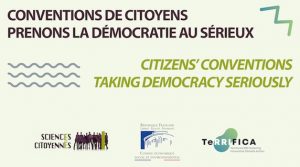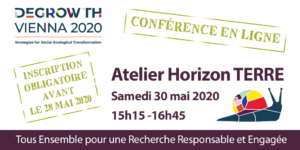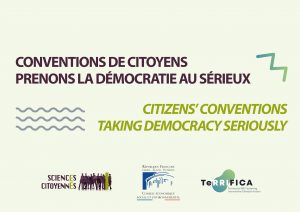Par
Fabien Piasecki,
Dominique Cellier et
Kevin Jean
mardi 21 juin 2022


As part of the citizen mobilizations of COP21 (United Nations Climate Change Conference) in 2015. Sciences Citoyennes decided to seize the matter of geo- engineering. Since then, we have participated to spreading acculturation on those controversial subjects.
SC chose to multiply formats and diffusion canals in order to make this information more accessible to everyone.
Lire la suite…
Publié dans : Democratisation of science |
Par
Fabien Piasecki,
Dominique Cellier et
Kevin Jean
mardi 21 juin 2022


As part of the citizen mobilizations of COP21 (United Nations Climate Change Conference) in 2015. Sciences Citoyennes decided to seize the matter of geo- engineering. Since then, we have participated to spreading acculturation on those controversial subjects.
SC chose to multiply formats and diffusion canals in order to make this information more accessible to everyone.
Lire la suite…
Publié dans : Democratisation of science |
Par
Sciences Citoyennes - Action collective
jeudi 2 juillet 2020

The videos of the conference in English are online!
 The 3rd TeRRIFICA Reflective Workshop and Conference “Citizens’ Conventions, Taking Democracy Seriously” was held in Paris on October 14th and 15th 2019. The event was hosted at the Economic Social and Environmental Council (CESE) and the Fondation Charles Léopold Mayer.
The 3rd TeRRIFICA Reflective Workshop and Conference “Citizens’ Conventions, Taking Democracy Seriously” was held in Paris on October 14th and 15th 2019. The event was hosted at the Economic Social and Environmental Council (CESE) and the Fondation Charles Léopold Mayer.
Sciences Citoyennes organized both activities within the framework of the H2020 TeRRIFICA project, whereby eight European institutions work together to foster competence for climate change adaptation and mitigation in different European regions with a specific focus on Responsible Research and Innovation.
Lire la suite…
Publié dans : Conventions de citoyens, Démocratisation de la science, Democratisation of science | Mots-clefs : Citizens' Conventions, Conventions de citoyens, TeRRIFICA
Par
Sciences Citoyennes - Action collective
vendredi 26 juin 2020

630 organisations de la société civile, dont Sciences Citoyennes, ont signé cette lettre ouverte alarmant les gouvernements sur une vague de plaintes COVID-19 dans des « tribunaux d’entreprise ». La lettre a été envoyée au Premier Ministre français Edouard Philippe. Retrouvez également le communiqué de presse expliquant l’initiative.
À l’endroit des gouvernements:
Aujourd’hui, nous vous invitons, par la présente lettre, à prendre l’initiative pour assurer que les pays du monde ne soient confrontés à une vague de poursuites de règlements des différends entre investisseurs et États (RDIE) en raison des mesures prises pour lutter contre la pandémie COVID-19 et la crise économique qui en découle.
Partout dans le monde, certains gouvernements prennent des mesures pour sauver des vies, endiguer la pandémie, protéger les emplois,lutter contre les catastrophes économiques et veiller à ce que les besoins fondamentaux des populations soient couverts. L’ampleur de ces mesures est sans précédent dans les temps modernes et la nécessité de ces actions est évidente. Cependant, la portée très étendue du mécanisme de RDIE pourrait exposer ces mesures gouvernementales cruciales à des plaintes avec demande d’indemnisation à hauteur de plusieurs millions de dollars de la part des investisseurs étrangers. Le nombre de ces plaintes pourrait également être sans précédent et imposer des charges financières considérables aux gouvernements qui croulent déjà sous le fardeau des crises sanitaires et économiques dévastatrices.
Lire la suite…
Publié dans : C- Élaboration démocratique des choix scientifiques et techniques, Conflits d'intérêts, Democratisation of science, Déontologie de la recherche, Deontology of research, Expertise | Mots-clefs : CETA, Gouvernance de la recherche, Marchandisation, TAFTA
Par
Sciences Citoyennes - Action collective
mardi 26 mai 2020

Le projet Horizon Terre, porté par les associations Sciences Citoyennes, Ingénieurs sans Frontières et le collectif Atécopol, depuis septembre 2019, vise à créer des scénarios de recherche alternatifs à ceux d’Horizon Europe (le programme cadre de recherche de l’Union Européenne) dans l’objectif de créer des synergies entre les collectifs de chercheurs et d’étudiants et in fine, de faire du plaidoyer au niveau européen et national pour contribuer à faire infléchir les politiques d’orientation de la recherche selon les axes définis par les membres du projet.

Les membres du projet vont animer un premier un évènement public de consultation sous la forme d’un atelier durant la Vienna Degrowth Conference. Cet atelier en anglais aura lieu en ligne le samedi 30 mai de 15h15 à 16h45. Animé par des chercheurs (sciences sociales et sciences expérimentales) et des experts associatifs, il s’adresse à une trentaine de participants.
Lire la suite…
Publié dans : Démocratisation de la science, Democratisation of science, Sciences sans croissance | Mots-clefs : Décroissance, Liberté d'expression et débats
Par
Sciences Citoyennes
mercredi 22 janvier 2020

Une réponse écrite par Jérôme Santolini, chercheur en Biologie, administrateur de Sciences Citoyennes, membre de « Cantine Sans Plastique France » et coauteur du livre « Pas de plastique dans nos assiettes – des perturbateurs endocriniens à la cantine »
Il y a quelques jours, les député.es Claire Pitollat et Laurianne Rossi présentaient en grande pompe le rapport de leur mission d’information parlementaire sur les perturbateurs endocriniens présents dans les contenants en plastique. En écho aux annonces officielles et médiatiques (vidéos, articles…), le rapport souligne avec emphase l’urgence de la situation, l’ampleur de la crise sanitaire.
Lire la suite…
Publié dans : C- Liberté d'expression scientifique, Democratisation of science, Lanceurs d'alerte, Politique de la recherche | Mots-clefs : Perturbateurs endocriniens, plastique
Par
Sciences Citoyennes
mercredi 6 novembre 2019

La conférence Conventions de Citoyens, prenons la démocratie au sérieux s’est tenue le 14 octobre 2019 au Conseil économique social et environnemental (CESE), dans le cadre du projet européen sur la co-création d’action contre le changement climatique, TeRRIFICA – Territorial Responsible Research and Innovation Fostering Innovative Climate Action.
 Les Assemblées citoyennes en Irlande, l’annonce par Emmanuel Macron d’une Convention citoyenne pour la transition écologique, les revendications d’organisations environnementales pour une Assemblée citoyenne face à l’urgence climatique et écologique, les promesses de démocratie par le digital… Les revendications pour que l’avis des citoyens soit au cœur des décisions politiques sont nombreuses. Mais quelle procédure de démocratie participative mettre en place ? Selon quelles conditions une telle procédure peut-elle être réellement démocratique et prendre en compte l’avis éclairé des citoyens ?
Les Assemblées citoyennes en Irlande, l’annonce par Emmanuel Macron d’une Convention citoyenne pour la transition écologique, les revendications d’organisations environnementales pour une Assemblée citoyenne face à l’urgence climatique et écologique, les promesses de démocratie par le digital… Les revendications pour que l’avis des citoyens soit au cœur des décisions politiques sont nombreuses. Mais quelle procédure de démocratie participative mettre en place ? Selon quelles conditions une telle procédure peut-elle être réellement démocratique et prendre en compte l’avis éclairé des citoyens ?
Lire la suite…
Publié dans : Conventions de citoyens, Démocratisation de la science, Democratisation of science | Mots-clefs : Conventions de citoyens
Par
Sciences Citoyennes - Action collective
mardi 11 décembre 2018

Sciences Citoyennes est co-signataire de cette lettre ouverte aux parlementaires européens
Dear Member of the European Parliament,
on Wednesday 12 December, you will make a decisive vote on the proposal for a European Defence Fund to dedicate €13 billion for research and development projects in military technologies during the next multi-financial framework.
44 non-profit organisations across Europe have recently alerted about the risks the current proposal entails, regarding the diversion of funds from civilian priorities and the over-influence of the arms industry, as well as the possible contribution to the development of killer-robots and the future exports of EU-funded goods.
Lire la suite…
Publié dans : Démocratisation de la science, Democratisation of science | Mots-clefs : Défense, Robots tueurs, Union européenne
Par
Sciences Citoyennes - Action collective
vendredi 12 janvier 2018

Europe’s next budget for research-funding could reach €120-billion for the coming seven years. The European Parliament will vote in 2019 on its allocation in the next Research Framework Programme (FP9). Once again, most of that money will be granted to multinational companies, unless…
Sciences Citoyennes and Global Health Advocates, supported by a coalition of European non-governmental organisations (NGOs), have succeeded in convincing of the need for revitalisation of European democracy. The goal can only be achieved through the political engagement of citizens. Lire la suite…
Publié dans : Conventions de citoyens, Democratisation of science, Politiques de recherche en Europe | Mots-clefs : democratisation of science
Par
Christian Vélot
mercredi 18 mai 2016

Article proposed and written by an advisory board member of Sciences Citoyennes, Christian Vélot1,2,3,4* , about democracy in science and public engagement, illustrated by a concrete example of participatory research. This is an open-access article, originally published here : http://journal.frontiersin.org/article/10.3389/fpubh.2016.00096/full. Lire la suite…
Publié dans : Democratisation of science, Deontology of research, Manipulation du vivant, Third-sector of knowledge |
Par
Sciences Citoyennes - Action collective
lundi 25 janvier 2016

As a result of a collective work, here is our Manifesto for a Responsible Scientific Research. Fondation Sciences Citoyennes purpose is to encourage debates concerning the scientific research aims and the means to implement individual and collective accountability in this field. Lire la suite…
Publié dans : Democratisation of science, Deontology of research |
Par
Fabien Piasecki et
Jacques Testart
mercredi 28 octobre 2015

What is a Citizens Convention?
The Citizens Convention is a participatory procedure aiming at informing people about political decision processes on research and innovation issues. It combines three phases: a prior training (during which a drawn by lot group of 15 citizens are studying), an active intervention (during which these citizens are questioning) and a collective positioning (during which citizens are expressing an advice). A Citizens Convention offers an appropriate setting for general concerns without any geographical restriction. The only limitation is the level of maturation of the dealt topic, which must be high enough.
Lire la suite…
Publié dans : Democratisation of science |
Par
Claudia Neubauer
mercredi 28 octobre 2015

This articles was written by Claudia Neubauer (FSC) and Matthieu Calame (FPH) in 2013. It was published in the 5th GUNi Report Higher Education in the World: Knowledge, Engagement and Higher Education: Contributing to Social Change, which has been published in February 2014 by Palgrave Macmillan.
GUNI2013_Redesign progress_CN_MAC
Lire la suite…
Publié dans : Democratisation of science, Manipulation du vivant |
Par
Claudia Neubauer
lundi 4 février 2013

This key note was held by Dr. Claudia Neubauer, former director of Fondation Sciences Citoyennes, at the EISRI meeting (European Intersectoral Summit on Research and Innovation), Trinity College Dublin – 25-26 February 2013
Lire la suite…
Publié dans : Democratisation of science |
Par
Claudia Neubauer
mardi 4 septembre 2012

The article on Opening Up Societal Futures through EU Research and Innovation Agendas was written by Les Levidow (Open University, Milton Keynes) and Claudia Neubauer (Fondation Sciences Citoyennes, Paris). It was published in EASST Revue, Volume 31 (3) European Association for the Study of Science and Technology, September 2012.
Lire la suite…
Publié dans : Democratisation of science |
Par
Sciences Citoyennes
mercredi 4 juillet 2012

FSC and other NGOs have been fighting for more than a year for a fairer and greener program for Horizon 2020, the research and innovation framework program of the European Commission.
See here the Open Letter to the European Commission concerning the Common Strategic Framework for EU Research and Innovation Funding (2014-2020), sent by more than 100 organizations of researchers and from civil society : Open Letter on the Common Strategic Framework for EU Research and Innovation Funding Lire la suite…
Publié dans : Democratisation of science, FP8 |
Par
Sciences Citoyennes
mardi 4 janvier 2011

The STEPS Centre from the University of Sussex published this Manifesto in 2010.
The Manifesto states at its beginning: « We live in a time of unprecedented advances in science and technology. The world is ever more globalised and interconnected. Yet poverty is deepening, the environment is in crises and progress towards the Millenuim development goals has stalled. » Lire la suite…
Publié dans : Democratisation of science |
Par
Claudia Neubauer
samedi 4 septembre 2010

This pamphlet is an output of the STACS (Science, Technology and Civil Society) project, funded by the European Commission Sixth Framework Programme (Science and Society-19-044597).
The pamphlet
CitizensScientists_Pamphlet
Preface: Fieldwork
Consider the cauliflower. The cauliflowers we eat now tend to be big, white and fluffy. They have been bred this way over the last 30 years, taking the place of the various Italian varieties that were once bred on farms. Europe has largely forgotten the other possible shapes, colours – green, yellow, pink and purple – and flavours of cauliflowers. In the fields and village markets of Brittany, a group of farmers, activists and scientists are trying to help us remember. Lire la suite…
Publié dans : C- Élaboration démocratique des choix scientifiques et techniques, C- Tiers-secteur scientifique, Democratisation of science, Deontology of research, Expertise, Third-sector of knowledge | Mots-clefs : STACS
Par
Sciences Citoyennes
mardi 4 novembre 2008

In June 2008, four NGOs – ETC Group from Canada, Bede (Biodiversité – échange et diffusion d’expériences) and Fondation Sciences Citoyennes from France and the What Next ? Institute from Sweden invited international NGOs to participate to a common strategic meeting on emerging technologies – BANG.
Lire la suite…
Publié dans : Democratisation of science |
Par
Sciences Citoyennes
mardi 4 décembre 2007

Report of the Expert Group on Science and Governance to the Science, Economy and Society Directorate, Directorate-General for Research, European Commission, 2007
This report is the product of an expert working group acting under mandate from the European Commission Directorate General for Research (DG RTD), on the topic of European science and governance.
Ulrike Felt (rapporteur)
Brian Wynne (chairman)
Members of the Expert group: Michel Callon, Maria Eduarda Gonçalves, Sheila Jasanoff, Maria Jepsen, Pierre-Benoît Joly, Zdenek Konopasek, Stefan May, Claudia Neubauer, Arie Rip, Karen Siune, Andy Stirling, Mariachiara Tallacchini
Lire la suite…
Publié dans : Democratisation of science |
Par
Sciences Citoyennes
samedi 4 juin 2005

European Science Social Forum Network
The European Science Social Forum Network was a platform of non-profit associations and NGOs as well as individual persons that worked to get a model of scientific and technological progress engaged with a solidary, sustainable and fair society.
During the third European Social Forum held from the 15th to the 17th October 2004 in London, a number of NGOs and associations working on the field of science and society (i.e., commercial control of science, science and militarism, human genetics, agriculture, science and citisenship, etc) came together. The opportunity was used to stablish an informal network that would help us to coordinate campaigns and organize common actions, as well as to share information, documents, ideas, human resources, etc.
Lire la suite…
Publié dans : Democratisation of science, Third-sector of knowledge |








